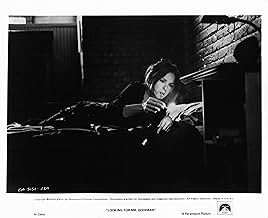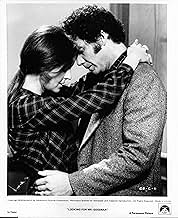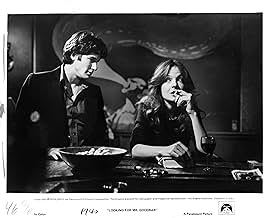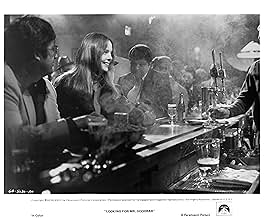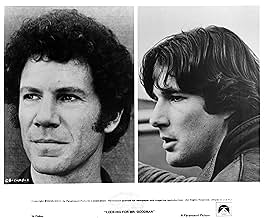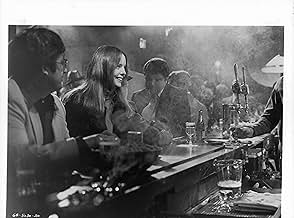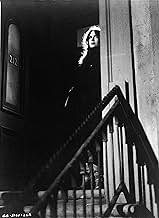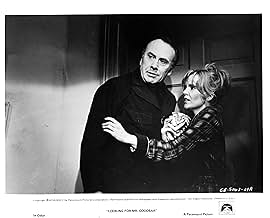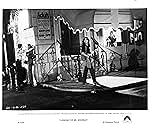NOTE IMDb
6,7/10
9,3 k
MA NOTE
Une institutrice dévouée passe ses nuits dans les bars, à la recherche d'hommes violents avec lesquels elle aura des relations sexuelles de plus en plus brutales.Une institutrice dévouée passe ses nuits dans les bars, à la recherche d'hommes violents avec lesquels elle aura des relations sexuelles de plus en plus brutales.Une institutrice dévouée passe ses nuits dans les bars, à la recherche d'hommes violents avec lesquels elle aura des relations sexuelles de plus en plus brutales.
- Réalisation
- Scénario
- Casting principal
- Nommé pour 2 Oscars
- 1 victoire et 6 nominations au total
Avis à la une
The movie really gets the whole 1970s drug sniffing, gay liberation, pro swinger pre aids lifestyle down, and then closes with what may be one of the most depressing endings ever shot for a movie. As we all know, Diane Keaton is the straight laced teacher by day, and bar hopper by night. Her Catholic background and domineering father all contribute to her rampant promiscuity, and she ends up paying for it in the end. Sad, because the sexual revolution of the time gave women the right to do what she does in the film without being called whores, and then she had to pay for it. Such a good flick though, although it could have used a little editing for time. See it, and decide for yourself. Highly recommended, and perfect depiction of a life that really is impossible to imagine in this day and age.
Few viewers can deny the impact of this film on the '77 crowd and generations afterwards. As a curious 8-year-old up late watching HBO, I never forgot the story or the lesson. Based on a true story, Richard Brooks astutely translated Judith Rossner's best-selling novel to screen, choosing a luminous Diane Keaton, hot off `Annie Hall' and `The Godfather' to play Theresa Dunn, an up-and-coming Richard Gere, a quirky Tuesday Weld , and amazing Richard Kiley as Dunn, the overbearing Irish-Catholic father. The misogynistic Richard Atherton and an ominous Tom Berenger rounds out the solid cast.
Neither traditionally beautiful like her stewardess sister, Katherine or a baby factory like her other sister living at home with her, Theresa is the odd one out, the sister who is searching for approval from a father who barely acknowledges her existence. Childhood traumas mold her and make the fact that Theresa allows herself to be strong and fallible all the more powerful and endearing.
Tired of her father's unyielding rule, Theresa moves into the apartment building owned by Katherine's next attempt at a husband. As the women's freedom movement is underway, Theresa is caught in the position of questioning the traditional roles for women, roles against a new woman in control of her body and her sexuality. By day she teaches at a school for the deaf. By night her nightly jaunts into New York's seamier nightlife scene, expose the dichotomy of being a professional woman by day who must maintain credibility and responsibility, especially with young children while trying to be sexually active, experimental and suffering the stigma attached to both as whore and as a free woman wanting purely physical experiences much the same as men, yet realizing the label is different.
Throughout this film, Brooks explores Theresa's perpetual search for acceptance by men but a need to maintain her own identity. From a failed affair with a Prof. she was a TA to, to her fling with Tony, a local hustler, Theresa is perpetually in question of her sexuality and her allure for men, making poor choices in her partners only to endure their violence and possessiveness - much like her father. That she meets up with a homicidal drifter the New Year's Eve night she has decided to quit drugs and cruising, is the irony of her self-discovery.
The only positive male in her life appears to be is LaVar Burton's character, Cap Jackson, the sullen brother of one of Theresa's students. He is the only male presence in the movie that is not malevolent or trying to extract something from Theresa and during her altercation with Tony at the school, he is the only person to defend and protect her.
While the scare of AIDS stole later generations' promiscuity, this tale still resonates for viewers, especially for women on their own, looking for intimacy yet craving isolation.
While the ending tends to drag with one too many drug scenes the movie still packs a wallop for a finale.
Neither traditionally beautiful like her stewardess sister, Katherine or a baby factory like her other sister living at home with her, Theresa is the odd one out, the sister who is searching for approval from a father who barely acknowledges her existence. Childhood traumas mold her and make the fact that Theresa allows herself to be strong and fallible all the more powerful and endearing.
Tired of her father's unyielding rule, Theresa moves into the apartment building owned by Katherine's next attempt at a husband. As the women's freedom movement is underway, Theresa is caught in the position of questioning the traditional roles for women, roles against a new woman in control of her body and her sexuality. By day she teaches at a school for the deaf. By night her nightly jaunts into New York's seamier nightlife scene, expose the dichotomy of being a professional woman by day who must maintain credibility and responsibility, especially with young children while trying to be sexually active, experimental and suffering the stigma attached to both as whore and as a free woman wanting purely physical experiences much the same as men, yet realizing the label is different.
Throughout this film, Brooks explores Theresa's perpetual search for acceptance by men but a need to maintain her own identity. From a failed affair with a Prof. she was a TA to, to her fling with Tony, a local hustler, Theresa is perpetually in question of her sexuality and her allure for men, making poor choices in her partners only to endure their violence and possessiveness - much like her father. That she meets up with a homicidal drifter the New Year's Eve night she has decided to quit drugs and cruising, is the irony of her self-discovery.
The only positive male in her life appears to be is LaVar Burton's character, Cap Jackson, the sullen brother of one of Theresa's students. He is the only male presence in the movie that is not malevolent or trying to extract something from Theresa and during her altercation with Tony at the school, he is the only person to defend and protect her.
While the scare of AIDS stole later generations' promiscuity, this tale still resonates for viewers, especially for women on their own, looking for intimacy yet craving isolation.
While the ending tends to drag with one too many drug scenes the movie still packs a wallop for a finale.
Looking For Mr. Goodbar isn't exactly the kind of feel good movie you might want to pop in on a rainy Sunday afternoon. It's heavy - almost suffocatingly so at times. What it does offer is a great chance for Diane Keaton to play a very different kind of character. Her Theresa is nothing like her Annie Hall or Nina Banks and that's refreshing to see. It's also an excellent time capsule of New York City life in the 70's.
With an upbeat 70's disco soundtrack (odds are, you'll know most of the tunes), Looking For Mr. Goodbar tracks a schoolteacher looking for love, passion, and satisfaction anyway she can find it. Sometimes it leads to heartbreak, sometimes it leads to danger, but it always leads to depression for the audience.
It's been a long time since I've seen a film this aggressively depressing and cynical and, to be honest, it's hard for me to process. On one hand, Keaton's work is exceptional, but on the other hand, it's a pretty tough slog to sit through. One needs to be in the right frame of mind to make it through.
With an upbeat 70's disco soundtrack (odds are, you'll know most of the tunes), Looking For Mr. Goodbar tracks a schoolteacher looking for love, passion, and satisfaction anyway she can find it. Sometimes it leads to heartbreak, sometimes it leads to danger, but it always leads to depression for the audience.
It's been a long time since I've seen a film this aggressively depressing and cynical and, to be honest, it's hard for me to process. On one hand, Keaton's work is exceptional, but on the other hand, it's a pretty tough slog to sit through. One needs to be in the right frame of mind to make it through.
Thersea Dunn (Diane Keaton) is a dedicated teacher by day. By night she cruises bars picking up men for increasingly violent sexual encounters. This leads to drug abuse and starts affecting her job. Can she stop?
A VERY negative view of the swinging 70s before AIDS came about in the 80s. I originally saw this on TV when I was in high school where it was cut to ribbons and virtually incomprehensible. A revival theatre did show it a few months later so I got to see it uncut on the big screen. I was a little too young to understand it fully (a 10th grader doesn't know much about singles bars:)) but the message came through loud and clear--sex + drugs = death. There's more to it than that--they get into Dunn's family life and you see she grew up feeling neglected with an obnoxious loud father and a meek mother. There's also her sister Katherine (Tuesday Weld) who is also addicted to sex and drugs. Basically this is a very depressing film full of unpleasant characters and situations. Keaton is great in her role--she totally buried her "Annie Hall" image with this. She also did nude scenes which she previously refused to do. Weld was superb (and Oscar-nominated) for her role. It's also fun to see Richard Gere and LeVar Burton before they hit it big. Also a still unknown Tom Berenger pops up at the end in a very disturbing but crucial role. He had guts playing the role he does (I won't give it away). This movie has disappeared due to song rights (I believe) and that's too bad. It IS disturbing but an accurate portrayal of the dark side of the singles bars in the 1970s.
A VERY negative view of the swinging 70s before AIDS came about in the 80s. I originally saw this on TV when I was in high school where it was cut to ribbons and virtually incomprehensible. A revival theatre did show it a few months later so I got to see it uncut on the big screen. I was a little too young to understand it fully (a 10th grader doesn't know much about singles bars:)) but the message came through loud and clear--sex + drugs = death. There's more to it than that--they get into Dunn's family life and you see she grew up feeling neglected with an obnoxious loud father and a meek mother. There's also her sister Katherine (Tuesday Weld) who is also addicted to sex and drugs. Basically this is a very depressing film full of unpleasant characters and situations. Keaton is great in her role--she totally buried her "Annie Hall" image with this. She also did nude scenes which she previously refused to do. Weld was superb (and Oscar-nominated) for her role. It's also fun to see Richard Gere and LeVar Burton before they hit it big. Also a still unknown Tom Berenger pops up at the end in a very disturbing but crucial role. He had guts playing the role he does (I won't give it away). This movie has disappeared due to song rights (I believe) and that's too bad. It IS disturbing but an accurate portrayal of the dark side of the singles bars in the 1970s.
I saw this movie when it came out in the '70's. Living in Marin County, we were all experimenting with our new freedom of sexuality, (Hot Tubs included). This movie should have been a wakeup call. But naive as I was, the night I saw the movie, my friend and I went to a local pub afterwards. I met a handsome fellow and he invited me to his home nearby, where he said he had a warm fire going. I told him of the movie and made him swear he wasn't a Mr. Goodbar (in a joking, yet serious way). But dummy me, I believed he was OK, and the man turned out to be someone you'd rather not go home with. Nothing too drastic happened, but I didn't go home with strangers again. I also became a "poster child" or should I say the voice of reason regarding the fact that "free love" was really not what we were looking for. Women are usually looking to be loved, and although we now had choices, this choice was a poor example of what we really needed.
Tonight my boyfriend and I were listening to Could It Be Magic by Barry Manilow, and I could picture the ending with that music playing and the lights flashing, and the rest of it which as you already know is unforgettable. So much so, that it's something I wouldn't want to see again. At my age now, it just might be a little too much for my heart to handle, LOL
Tonight my boyfriend and I were listening to Could It Be Magic by Barry Manilow, and I could picture the ending with that music playing and the lights flashing, and the rest of it which as you already know is unforgettable. So much so, that it's something I wouldn't want to see again. At my age now, it just might be a little too much for my heart to handle, LOL
Le saviez-vous
- AnecdotesTom Berenger admitted in an interview that he had nightmares after he was finished shooting all of his scenes as Gary.
- GaffesTheresa is supposed to be a first-grade teacher, but all her students look to be way older. The youngest seem to be 9 or 10 while the oldest could be 12, 13 or even older.
- Crédits fousThe Paramount logo is shortened at both ends, fading in at the point the text already appears. It was gray-scaled in the closing version.
- ConnexionsFeatured in Sex, Censorship and the Silver Screen: Forward Into the Past (1996)
- Bandes originalesTry Me, I Know We Can Make It
Written by Donna Summer (uncredited), Giorgio Moroder (uncredited) and Pete Bellotte (uncredited)
Performed by Donna Summer
Courtesy of Casablanca Record & FilmWorks
Meilleurs choix
Connectez-vous pour évaluer et suivre la liste de favoris afin de recevoir des recommandations personnalisées
- How long is Looking for Mr. Goodbar?Alimenté par Alexa
Détails
Box-office
- Montant brut aux États-Unis et au Canada
- 22 512 655 $US
- Week-end de sortie aux États-Unis et au Canada
- 1 540 635 $US
- 23 oct. 1977
- Montant brut mondial
- 22 513 584 $US
- Durée2 heures 16 minutes
- Mixage
- Rapport de forme
- 1.85 : 1
Contribuer à cette page
Suggérer une modification ou ajouter du contenu manquant


